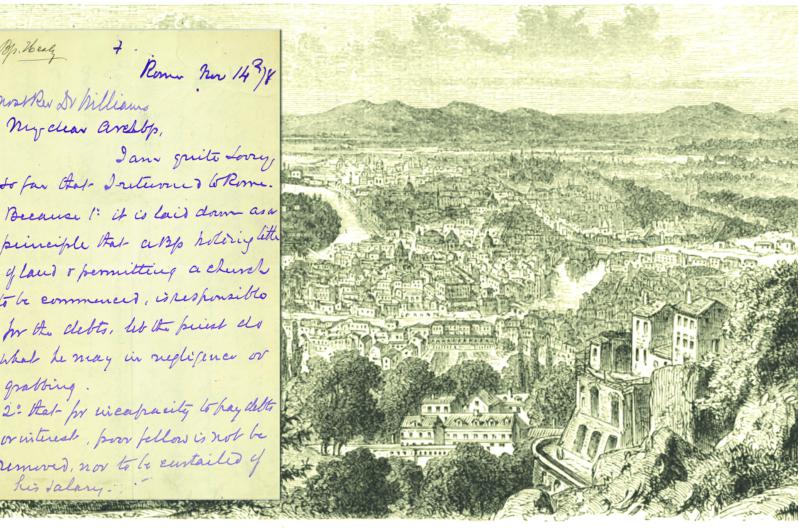Bishop Healy writes to Archbishop Williams from Rome
In November 1878, James Augustine Healy, Bishop of Portland, Maine, travelled to the Vatican to meet the new pope, Leo XIII, and to prosecute a case against an unscrupulous priest.
James Augustine Healy was born in 1830 near Macon, Georgia, to a mixed-race slave mother and Irish immigrant plantation owner. Like many mixed-race children of the time, he was sent to school in the North, where he found academic success at a Quaker school in Flushing, New York. He went on to attend the newly opened College of the Holy Cross in Worcester, where he graduated as valedictorian of the college's first graduating class.
After college, Healy discerned a vocation to the priesthood. Since he could not study at the Jesuit novitiate in Maryland, a slave state, he entered a Sulpician seminary in Montreal. In 1852, he transferred to study at St. Sulpice Seminary in Paris. Two years later, on June 10, 1854, he was ordained a priest for the Diocese of Boston at Notre Dame Cathedral, becoming the first African American Catholic priest.
Healy's light skin allowed him to pass for white during his lifetime, and he identified and was accepted as Irish to all but his closest mentors in the Church. By keeping his race a secret, he was able to advance in the Church in a way that otherwise would not have been possible for an African American in the 19th century. In December 1854, he was assigned to the Cathedral of the Holy Cross in Boston, where he served as secretary to Bishop John B. Fitzpatrick. The following year, he was named the first chancellor of the Diocese of Boston. In 1866, he was appointed pastor of Boston's St. James Church, which boasted the largest congregation in the diocese. His success in each of these prominent roles culminated in his 1875 appointment by Pope Pius IX as the second Bishop of Portland.
Upon becoming bishop, Bishop Healy was almost immediately drawn into a dispute with Father Jean F. Ponsardin, a Sulpician priest serving the French-Canadian population in the small city of Biddeford, Maine. Father Ponsardin had been tasked with building a new church for the parishioners of St. Joseph Parish, and Bishop Healy suspected him of embezzlement; after four years of construction, the church consisted only of a basement and unfinished exterior walls. When Father Ponsardin complained to Bishop Healy that the diocese owed the parish money for construction costs, the bishop refused to pay.
On Oct. 6, 1877, Father Ponsardin submitted an appeal to Archbishop John J. Williams of Boston, asking him to review the matter. Archbishop Williams immediately wrote to Bishop Healy, warning him to "be careful with (Father Ponsardin) as he is determined apparently to push matters as far as he can." Bishop Healy did not heed this warning. On Oct. 18, he dismissed Father Ponsardin and forbade him from celebrating Mass. Two weeks later, Archbishop Williams refused to hear Father Ponsardin's appeal, and the priest appealed to Rome.
The following autumn, Bishop Healy travelled to Rome to prosecute the case in person, armed with canon and civil lawyers and with sworn statements from 17 parishioners from St. Joseph about their former pastor's financial misdeeds. From Rome, Bishop Healy kept Archbishop Williams informed of the proceedings. "It is certainly a difficult position for me," he wrote, "If that man goes back it is sure division and discouragement. And yet to disobey (if Rome ruled in Father Ponsardin's favor) would be a scandal."
He complained, "It has been a hard case indeed simply for the reason that I had been so patient and merciful in spite of (Father Ponsardin's) neglect of interest, neglect of repairs ... continual insults, continual refusal to obey -- and that at last finding that instead of fulfilling his obligations to the debtors, he continued to take from the surplus, leaving me always in the lurch."
As much as Bishop Healy opposed the diocese assuming any debts incurred by Father Ponsardin, he was willing to compromise on one condition. "I would pay him if he left the Diocese," he wrote, "I should be glad to get him off my hands and I hear he is willing to go."
In the end, this solution was accepted by all. After receiving a financial settlement, Father Ponsardin left Maine for the tough mining town of Leadville, Colorado. He served as pastor of Sacred Heart of Jesus Church for about five years, afterward returning to his native France.
Bishop Healy remained Bishop of Portland until his death in 1900. In 1887, in part to avoid disputes like the one with Father Ponsardin, Maine enacted a Corporation Sole law, making the Bishop of Portland the legal owner of the property of all parishes in the state of Maine. While this law gave the bishop more control over financial matters, ironically it also solidified his responsibility for debts incurred by irresponsible or unethical priests.
VIOLET HURST IS AN ARCHIVIST FOR THE ARCHDIOCESE OF BOSTON.



















